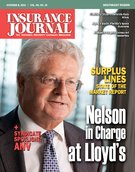A new partnership formed between Space Florida, the spaceport authority and aerospace development organization for the state, and insurance agency Assure Space is counting on new space insurance capabilities driving more jobs and investments in Florida’s space business.
Richard Parker, managing director of Bethesda, Md.-based Assure Space, LLC, said his firm approached Space Florida about partnering because the agency saw a chance to help Florida become a true commercial space player. The end of the NASA shuttle program has opened up more commercial and investment prospects in Florida’s space business.
“Originally, the space program would do space missions such as launching satellites,” he said. “Now that the space program is gone, we think the commercial space market will come back to Florida.”
Satellite technology has become a booming industry, with everything from cable TV to wireless devices utilizing satellite operators and launchers to broadcast their data. Parker says the only secure way for commercial companies to make the investment to manufacture satellites and launch them into space is with insurance because it is so risky and costly. The average policy limits are around $200 to $300 million.
Space Florida and Assure Space hope to encourage investments in Florida’s commercial space market by providing access to insurance resources. “With the end of the shuttle program Florida still wants to be a space state and in the space business,” he said.
Parker has been specializing in the space insurance industry for 25 years and was the former technical director at AXA Space.
“It is a very specialized area and there are not many satellite underwriters in the U.S., so we saw a real opportunity,” he said.
Assure Space received financial backing from Auster Capital Partners, a private equity firm that specializes in the information technology sector.
The agency is currently offering up to $10 million in capacity for satellite manufacturing and launching companies, but Parker said it is seeking to grow its capacity next year with other partners. The space insurance industry works by grouping satellite and space underwriters together to obtain the needed policy limits. Assure Space works with other big space brokers including Marsh, Willis and Aon.
“Yes, you have competitors, but at the same time you can all be on the same risk and can all participate because of the very high insurance required,” he says.
Assure Space’s coverage is essentially an all-risk policy with few exclusions. It covers the hardware, satellite and launch vehicle, as well as a satellite failure because of a design issue, meteor strike, or an environmental issue.
Other perils that could cause damage like space debris – currently a very big topic in the industry – are also covered. However, Parker said the majority of satellites Assure Space covers are being launched into a higher altitude of at least 22,000 miles and the majority of the debris congestion is located at a lower altitude, but it is still a consideration.
“We do ask insureds to tell us how they manage the debris issue,” said Parker. “Are they looking ahead, getting data from the U.S. government? How are they avoiding debris?”
Space insurance premiums typically run about $25 million. Rates are low at the moment, according to Parker, despite the fact that claims can be catastrophic, because they are usually total losses that occur at the time of a launch.
“Anyone involved in this business is not going to go without insurance for such a significant investment,” said Parker. “There is a lot of capacity out there and it has been quite a profitable class of business.”
It is not a market, however, that one can enter lightly. According to Parker, it takes about three years for a manufacturer to build a satellite at a cost of several hundred million dollars. After that, there is risk of loss to the satellite purchaser during delivery and launch. Then there is the possibility of damage while the satellite is in orbit.
“They can’t fix a satellite once it is launched into space if anything goes wrong,” said Parker. “The manufacturer or launcher do not offer any money back. All that risk has been transferred to the insurance market.”
The same is true for the launch vehicle. “The company will attempt to launch and if it is a failure you don’t get anything back; it’s over,” said Parker.
Limited underwriting data contributes to this being a difficult class. “The actuarial data on a satellite is very limited – we just don’t have enough to make a conclusion on if a satellite is going to be successful or not,” he said. “We can just look at it with the best of our ability and underwrite on that basis.”
Topics Florida Market Manufacturing
Was this article valuable?
Here are more articles you may enjoy.


 Zurich Insurance Profit Beats Estimates as CEO Eyes Beazley
Zurich Insurance Profit Beats Estimates as CEO Eyes Beazley  Viewpoint: Runoff Specialists Have Evolved Into Key Strategic Partners for Insurers
Viewpoint: Runoff Specialists Have Evolved Into Key Strategic Partners for Insurers  AI Claim Assistant Now Taking Auto Damage Claims Calls at Travelers
AI Claim Assistant Now Taking Auto Damage Claims Calls at Travelers  State Farm Adjuster’s Opinion Does Not Override Policy Exclusion in MS Sewage Backup
State Farm Adjuster’s Opinion Does Not Override Policy Exclusion in MS Sewage Backup 


